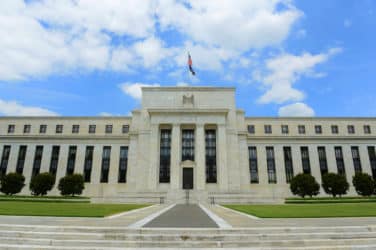It could all come down to Friday’s economic data report, according to traders.
This Friday, the Labor Department releases the monthly non-farm payrolls data and employment data, which if strong, could signal to the Federal Open Market Committee the economy is strong enough to withstand a hike in interest rates.
“It looks like the Fed could get the ammunition it needs to finally move rates if the jobs number comes in strong,” a trader said. “The jobs situation has been pretty good but one more solid report could finally convince them the economy can handle a slight increase in rates.”
And that was what several other traders told Markets Media last week, as US equity markets ended last week with a whimper as the one-two punch of remarks from Federal Reserve Chair Janet Yellen and Vice Chairman Stanley Fischer gave the markets a bit of late week indigestion. The two intonated that the upcoming employment report could be the tipping point for the central bank – to move from inactivity to raising short-term interest rates.
Traders added that this week is also laden with more important economic indicators including consumer confidence, home sales, not to mention the aforementioned non-farm payrolls data.
“They want to raise interest rates,” a floor trader said, “but they need just a little more proof the economy can handle it.”
Bearing all this, actual trading volumes last week was light again. Last week the volume traded on U.S. equity exchanges averaged 5.68 billion shares per day for the week ended August 26, according to Bats Global Markets data. That’s down from an average of 5.92 billion shares in the week ending August 19.
When the Federal Reserve met in July, eight of the 12 regional banks voted to raise the discount rate, the interest rate the central bank charges for loans to commercial banks, from 1% to 1.25%, minutes show. While the Fed left the rate at 1%, the vote marks the first time that a majority of the regional banks favored raising the discount rate since the central bank raised the benchmark federal funds rate in December.
The Fed Funds rate continues to price in a 18% chance of a September hike, 51% chance of a December rate hike.
In other news, despite a heavier regulatory burden and lackluster price share performance, the major banks reported record profits for the second quarter, besting aa record setfor the same period one year ago, according to SNL Financial and S&P Global Market Intelligence.
In the SNL/S&P report, profits for the quarter reached $43.6 billion, compared to the $43.01 billion in Q2 of 2015, a gain of 1.4 percent. Profits were $39.04 billion in the pervious quarter of a gain of 11.7 percent.
This Week’s U.S. Economic Indicators of Interest:
Monday Dallas Fed Mfg Index
Personal Income and Spending
Tuesday RedBook Retail Sales
Consumer Confidence
Wednesday Chicago Purchasing Managers PMI Index
New Home Sales
Thursday Weekly Jobless Claims
Chain Store Sales
US Motor Vehicle Sales
ISM Manufacturing Index
Construction Spending
Friday US Employment Report
International Trade
US Factory Orders
More on Trading:





